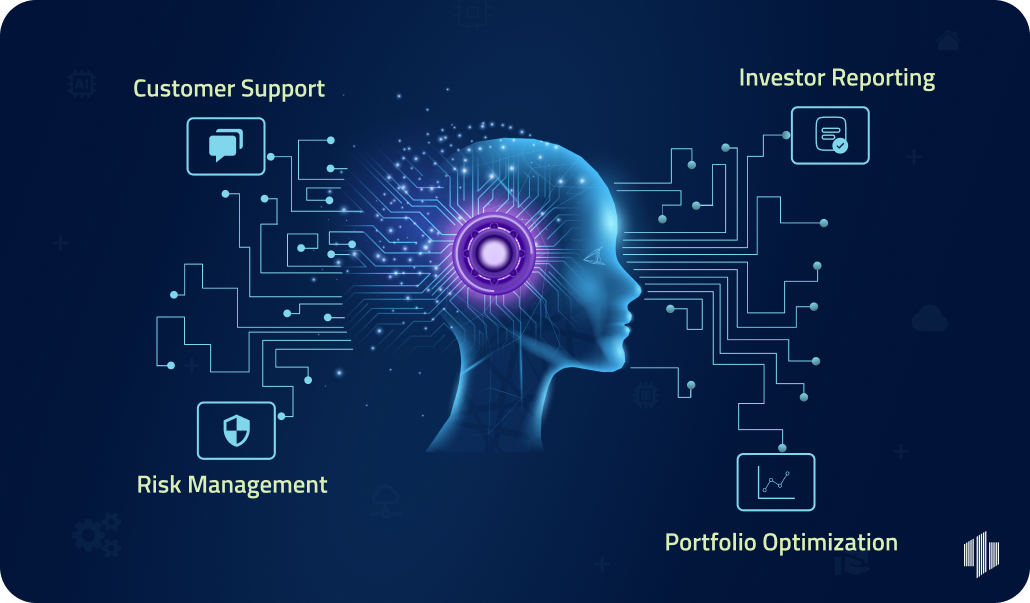Artificial intelligence (AI) is reshaping the mortgage servicing industry, offering innovative solutions to long-standing challenges. AI is poised to have a transformational impact on automating tasks, enhancing decision-making, and improving the borrower experience.
Four Key Areas for AI in Mortgage Servicing
While AI has myriad applications across the mortgage servicing lifecycle, these four domains present rich opportunities for process transformation:
- Customer support
- Investor Reporting
- Risk management
- Portfolio optimization
1. Customer Support
Customer support is perhaps the most common application of AI in the mortgage industry and will certainly get more robust as the technology matures.
- Chatbots and virtual assistants handle common borrower inquiries 24/7, reducing wait times.
- Sentiment analysis monitors borrower interactions to identify satisfaction levels and address concerns proactively.
- Personalized assistance builds on chatbot technology, recommending individually tailored solutions such as repayment plans or refinancing options.
Use case: AI-driven chatbots can answer frequently asked questions, freeing up human agents to focus on more complex borrower needs.
2. Investor Reporting
AI simplifies the complex requirements of investor reporting, ensuring accuracy and compliance.
- Data aggregation automatically collects and consolidates data from various sources, such as the servicing system or bank statements.
- Error checking identifies discrepancies in data before submission.
- Automated report generation ensures that reports are delivered in accordance with investor timelines and regulatory guidelines.
Use case: AI-driven platforms can prepare accurate, comprehensive investor reports in a fraction of the time it takes manually, reducing operational bottlenecks.
3. Risk Management
Machine learning and generative AI effectively power diverse risk management efforts.
- Automated data analysis identifies potentially fraudulent anomalies in borrower behavior or payment patterns.
- Compliance monitoring ensuring adherence to regulatory requirements through automated audits.
- Default prediction uses machine learning models to identify borrowers at risk of default.
Use case: Predictive analytics can flag loans with a high likelihood of delinquency, allowing servicers to take preventive measures.
4. Portfolio Optimization
AI-powered predictive analytics allow for proactive decision-making, more effective portfolio rebalancing, and strategic pricing, along with identifying relevant trends in real time.
- Predictive insights forecast market trends to inform portfolio strategies.
- Dynamic adjustments rebalance portfolios based on changing borrower behaviors or economic conditions.
- Performance tracking monitors KPIs to ensure optimal portfolio health.
Use case: Machine learning models can recommend adjustments to servicing strategies based on real-time portfolio performance data.
Industry Leaders Weigh in on AI in Mortgage Servicing
We recently asked industry leaders to share their predictions about the future of AI in mortgage servicing. At the 2025 MBA Servicing Conference in Dallas, our booth visitors could cast their votes for which domain would see the most impact from AI.

The overwhelming winner? Customer support. This makes perfect sense, given that AI has already been widely adopted for this function. For example, Bank of America’s chatbot Erica has reportedly had more than 1.5 billion interactions since its launch in 2018.
Meanwhile, several visitors were skeptical about AI for investor reporting. They cited the complications and intricacies of this business operation. But in our view, AI holds untapped opportunity for investor reporting. Similarly, AI will also enable more robust portfolio optimization as the technology matures.
How Is Integra Contributing?
Integra is committed to adopting AI technologies responsibly and ethically. In the coming year, we’ll be launching multiple AI initiatives across our software suite.
- AI-guided configuration and processing: In the Integra INVESTOR application, a trained AI assistant will guide users through configuring the system and running business processes. The next phase will incorporate department procedures to ensure standardization across analysts.
- Recon assistant: The system will also suggest possible reconciliation matches and custodial breaks for the analyst to consider. The model will also check the data inputs to assist Super Users handle processing exceptions.
Auto-configuration based on contract: In the Integra BILLING application, subservicing contracts will drive the configuration requirements via automation to produce the monthly invoice and remittance package. Analysts will verify the calculations but no longer will need to know all the mechanics of the application.

